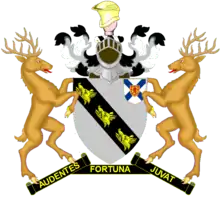Turing baronets
The Turing Baronetcy, of Foveran in the County of Aberdeen, is a title in the Baronetage of Nova Scotia.[2] It was created in 1638 for John Turing, who was granted the barony of Foveran in Aberdeenshire by the king. He was a supporter of Charles I and was taken prisoner by the Covenanters in 1639. In 1651, he fought at the Battle of Worcester. The Turing family descends from Sir William Turing, a supporter of David II (1329–1371).
| Turing baronets | |
|---|---|
 | |
| Crest | A hand holding a helmet Proper. |
| Blazon | Argent on a bend Sable three boar’s heads Or. |
| Supporters | Two stags Proper. |
| Motto | Audentes Fortuna Juvat [1] |
The cryptographer and computing pioneer Alan Turing was the uncle of the twelfth Baronet.[3][4]
Turing baronets, of Foveran (1638)
The following have been Turing baronets:[5]
- Sir John Turing, 1st Baronet (died 1662), created Baronet by the king
- Sir John Turing, 2nd Baronet (died 1682), grandson of his predecessor
- Sir John Turing, 3rd Baronet (1680–1733), grandnephew of the 1st Baronet
- Sir Alexander Turing, 4th Baronet (1702–1782), son of his predecessor
- Sir Inglis Turing, 5th Baronet (1743–1791), son of his predecessor
- Sir Robert Turing, 6th Baronet (1745–1831), brother of his predecessor
- Sir James Henry Turing, 7th Baronet (1791–1860), great-grandnephew of the 3rd Baronet
- Sir Robert Fraser Turing, 8th Baronet (1827–1913), son of his predecessor
- Sir James Walter Turing, 9th Baronet (1862–1928), son of his predecessor
- Sir Robert Andrew Henry Turing, 10th Baronet (1895–1970), son of his predecessor
- Sir John Leslie Turing, 11th Baronet (1895–1987), (younger twin) brother of his predecessor
- Sir John Dermot Turing, 12th Baronet (born 1961), great-great-grandnephew of the 7th Baronet
- Heir Apparent: John Malcolm Ferrier Turing (born 1988), son
- Second in line: James Robert Edward Turing (born 1991), son
Family tree
The Turing baronets are related as follows:
| William Turing of Foveran d. 1613 | |||||||||||||||||||||||||||||||||||||||||||||||||||||||||
| John Turing, 1st Baronet d. 1662 | Henry Turing d. 1657 | ||||||||||||||||||||||||||||||||||||||||||||||||||||||||
| George Turing d. 1657 | John Turing 1650–1681 | ||||||||||||||||||||||||||||||||||||||||||||||||||||||||
| John Turing, 2nd Baronet d. 1682 | John Turing, 3rd Baronet 1680–1733 | Walter Turing 1681–1743 | |||||||||||||||||||||||||||||||||||||||||||||||||||||||
| Alexander Turing, 4th Baronet 1702–1782 | James Turing 1714–1788 | ||||||||||||||||||||||||||||||||||||||||||||||||||||||||
| Inglis Turing, 5th Baronet 1743–1791 | Robert Turing, 6th Baronet 1745–1831 | John Turing 1751–1798 | |||||||||||||||||||||||||||||||||||||||||||||||||||||||
| James Turing, 7th Baronet 1791–1860 | John Turing 1793–1828 | ||||||||||||||||||||||||||||||||||||||||||||||||||||||||
| Robert Turing, 8th Baronet 1827–1913 | John Turing 1826–1883 | ||||||||||||||||||||||||||||||||||||||||||||||||||||||||
| James Turing, 9th Baronet 1862–1928 | Julius Turing 1873–1947 | ||||||||||||||||||||||||||||||||||||||||||||||||||||||||
| Robert Turing, 10th Baronet 1895[note 1]–1970 | John Turing, 11th Baronet 1895[note 2]–1987 | John Turing 1908–1983 | Alan Turing, OBE FRS 1912–1954 | ||||||||||||||||||||||||||||||||||||||||||||||||||||||
| John Turing, 12th Baronet b. 1961 | |||||||||||||||||||||||||||||||||||||||||||||||||||||||||
| John Turing, Heir Apparent b. 1988 | James Turing b. 1991 | ||||||||||||||||||||||||||||||||||||||||||||||||||||||||
- Older twin
- Younger twin
References
- Debrett's Peerage, Baronetage, Knightage, and Companionage, 1903
- Kidd, Charles, Williamson, David (editors). Debrett's Peerage and Baronetage (1990 edition). New York: St Martin's Press, 1990.,
- Burke's Peerage, Baronetage and Knightage, 2003, vol. 3, p. 3957
- "An interview with Dermot Turing: Alan Turing's nephew". UK: Loughborough University. 5 October 2016. Retrieved 22 January 2018.
- "Turing". thepeerage.com. The Peerage. Retrieved 2 November 2020.
This article is issued from Wikipedia. The text is licensed under Creative Commons - Attribution - Sharealike. Additional terms may apply for the media files.